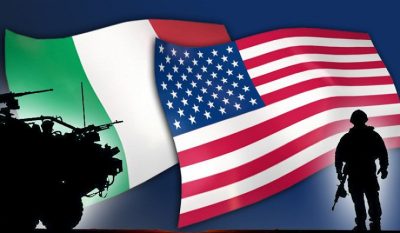No Economic Sovereignty Without Political Sovereignty

There is a current discussion on how much and what kind of funding Italy will receive from the European Union and under what conditions. Reassuring messages arrive from Brussels. But since such financing will be mostly provided in the form of loans, several economists warn that there is a danger of heavy debt and further loss of economic sovereignty.
Political-media attention therefore focuses on relations between Italy and the European Union. An important issue, which cannot however be separated from the relations between Italy and the United States, and nobody discusses in Parliament and major media.
Italian public continues to ignore the implications of this “assistance” plan for Italy launched by President Trump on April 10 (il manifesto, 14 April 2020). Yet the US ambassador to Italy, Lewis Eisenberg, calls it “the greatest financial aid that the United States has ever given to a Western European country since 1948, since the time of the Marshall Plan.”
In support of anti-Covid health activities, already “tens of million of dollars have gone and will go to the Red Cross and some non-governmental organizations” (not better identified). In addition to this, the plan provides for a series of interventions to “support the recovery of Italian economy“.
President Trump has ordered the Secretaries of Treasury and Commerce, the president of the Export-Import Bank, the administrator of the US Agency for International Development, the director of the United States International Development Finance Corporation (Government Agency financing private development projects) to use their tools to «support Italian companies» for this purpose. Nobody says which companies are and will be financed under this plan, nor under what conditions are these loans bound to.
Ambassador Eisenberg speaks in general of excellent relations between the United States and Italy, demonstrated by “important economic and strategic indicators“, including “one of the largest military agreements with Fincantieri“, which gained a contract of about $6 billion for the construction of ten US Navy multi-role frigates last May. The Italian group is controlled 70% by the Ministry of Economy and Finance, has three shipyards in the US, where four similar warships for Saudi Arabia are also under construction.
Another important economic and strategic indicator is the growing integration of Leonardo, the largest Italian military industry in the US military-industrial complex, especially through the largest US military industry Lockheed Martin. The Ministry of Economy and Finance is the main shareholder of Leonardo, which supplies the USA with products and services to the armed forces and intelligence agencies, and manages Lockheed’s F-35 fighters Martin factory in Cameri, Italy.
These and other powerful interests – especially those of large financial groups – bind Italy to the United States. Italy’s foreign and military policy is also an economic policy, subordinated to the strategy of the United States based on an increasingly acute political, economic and military confrontation with Russia and China. Washington’s plan is clear: exploiting the crisis and the fractures in the EU to strengthen US influence in Italy.
The consequences are obvious. For example, it would be in our national interest to remove sanctions to Moscow reviving Italian exports to Russia and restore export especially for small and medium-sized enterprises, this choice has been made impossible by our dependence on the choices made in Washington and Brussels. At the same time, Italy’s agreements with China under the New Silk Road project are under threat, they are not welcome to Washington.
The lack of real political sovereignty prevents these and other vital economic choices to exit the crisis. But, on political talk shows there is no mention of all this.
*
Note to readers: please click the share buttons above or below. Forward this article to your email lists. Crosspost on your blog site, internet forums. etc.
This article was originally published on Il Manifesto. Translated from Italian by Jean Toschi Marazzani Visconti.
Manlio Dinucci is a Research Associate of the Centre for Research on Globalization.

